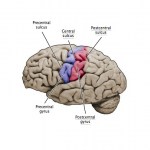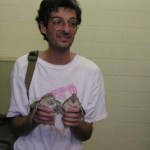
If you've been around Scienceblogs today, or on Twitter, you may have noticed that there appears to be a new blog around these parts.
On behalf of the team here at ScienceBlogs, I'd like to welcome you to Food Frontiers, a new project presented by PepsiCo. As part of this partnership, we'll hear from a wide range of experts on how the company is developing products rooted in rigorous, science-based nutrition standards to offer consumers more wholesome and enjoyable foods and beverages. The focus will be on innovations in science, nutrition and health policy. In addition to learning more about…
Here are my Research Blogging Editor's Selections for this week:
TwoYaks at the GeneFlow blog effectively criticizes the hypothesis that girls like pink and boys like blue because of evolved sex differences in hunting and foraging behaviors. Thankfully, a disclaimer is included so that evolutionary psychology isn't totally destroyed by the criticism: "Evo-Psych can be a good tool for exploring behaviour, when employed properly, and in a comparative context." My field thanks her.
The effects of magic mushrooms on the brain, via fMRI? Well, sort of. More like the effects of fMRI on the brain,…
Last week, Travis, Christie, Scicurious and I spent about 45 minutes in a skype conference call.
The first 15 minutes were spent making fun of Travis for his strange Canadian speech patterns, and sympathizing with poor Christie for not being able to talk to us while enjoying the beautiful Hawaiian air, because just as we were about to start, the gardeners started making noise outside. What a travesty. Of course this was all before Travis hit the record button on his recording software. Next time, maybe we'll record that stuff too.
So what's left are a handful of random musings on life as a…
"The males often prefer eating to mating."
Apparently, giant panda dudes (Ailuropoda melanoleuca) in captivity would rather sit around and munch on bamboo than get it on with the females. And this is a problem at the Chengdu Panda Breeding and Research Centre, where scientists are urging the pandas to breed, for conservation purposes.
What's the answer to this important problem? Panda porn, of course!
Pandas are known to be isolated creatures and poor breeders, and in captivity the problem may be exacerbated. Zhihe and his team have tried a number of measures to try to cure the male panda of…
I am quite full from the last minute Fourth of July dinner that my brother and I threw together - featuring grilled chicken-apple sausages, roasted pork tenderloin with lemon-pepper dry rub, and chocolate peanut butter cookies. Too full to blog. Instead as I'm working my way through season six of Buffy on Netflix, I've got something different for you today.
Instead of the usual Monday fare, I want you all to go over and say hello to The Dog Zombie.
She describes herself thusly:
The Dog Zombie studies dog brains by pursuing DVM and MS degrees. She is currently in her research year, between…
Looks like Drugmonkey has re-instated the who are you and why are you looking at me meme. Having only participated as a reader of Scienceblogs the last few years, I'm excited to be on the other side of the table this time.
For some background, Ed Yong initially started this game a few years ago, and it caught on pretty quickly among the other sciblings (and then, other science bloggers as well).
I particularly like the questions that Janet is asking this year, so I'll go ahead and blatantly plagiarize (and modify) some of hers. Please respond to any combination of these questions below in the…
There was so much good stuff this past week or two. Here's a round-up:
Dave Munger's column in Seed Magazine, regarding self-report data, features the blogcast I did with Travis a few weeks ago.
Seventh graders draw pictures of scientists. Then they meet some scientists. And draw new pictures.
Some more from the NY Times on the status of whales with respect to whether or not they should be given "human rights." I've written about this before.
And from Scientific American, is whaling really the biggest threat to whales?
Really fantastic article in The Guardian about Jane Goodall, who has now…
Upon waking up this morning, my sciblings and I discovered that many of us had become zombies.
What else could I do but capitalize on an internet meme, in between snacking on brains and flesh?
Surprisingly, some of my sciblings' BOOKS were even afflicted:
Imagine with me, for a moment, that the zombie invasion has begun. You try to escape, but the zombies are just too much to handle. You can't run fast enough. They're everywhere. Your favorite science bloggers have been turned into zombies and they're coming for you.
Figure 1: Thanks to Joseph Hewitt of Ataraxia Theatre for providing us with these awesome illustrations of zombified sciblings! Left to right: Christie, Sci, Bora, me, & Peter and Travis. Click on each to embiggen.
I'm sure you've always wondered what would happen as a zombie ate through your brain. How would it feel? What…
There are some great questions coming in to Ask a Scienceblogger! If you (or your kids?) have a question you want answered by a scienceblogger drop by Page 3.14 (the blog of the SB overlordz) and leave your question in the comments on this post.
Tyler asked:
It's said that the left hemisphere of the brain controls the right half of the body and vice versa. Does this apply to the processing of audio and visual stimulus of the ears and eyes as well? Does the left half of the brain process what the right eye sees and vice versa?
There's actual a few questions in here, so let's break this apart…
Sapri Li Ahuva (Tell me, beloved) by one of my fave Israeli singers, Dindin Aviv.
For those who don't understand Hebrew, here is a transliteration (courtesy hebrewsongs.com):
Tell me beloved, with your beautiful eyes
What does your heart desire?
Tell me child, beautiful in my dream
How will I wake you up for the day?
Day, another night, and a day
I am awake and my heart is asleep
What I used to be is gone
From all the has passed it seems
Only when you are with me
My heart is playing a melody
The one loved by your soul
I looked for all over the city
Locked garden you are
Open it for me,…
One of my scientific heroes, Richard Feynman, explains confusion and stupidity:
Albert Einstein said: "If we knew what we were doing, it wouldn't be called Research."
If you're going to be doing research, you better be comfortable with feeling stupid.
Here are my ResearchBlogging Editor's Selections for this week.
Today's selections will appear in haiku form.
How hungry are you?
Hunger affects decisions,
says Christian Jarrett.
Touch and texture, too,
at Neurophilosophy,
alter decisions.
Science and Reason
explores creativity
and mental illness.
Social Rejection?
Study says take Tylenol.
Neurocritic laughs.
Fellow primate enthusiast Eric M. Johnson celebrates the one year blogoversary of the Scienceblogs incarnation of The Primate Diaries, today. Go on over and say hello.
The science-loving band OK Go (whose newest video messes with time perception) has another hilarious video out there. Not a music video, mind you. Just a video.
It appears they had a bit of a run-in with Animal, of the muppets, at the Webby Awards.
Those dudes are hilarious.
She: "What are you writing about?"
Me: "Cognition in cold-blooded animals."
She: "Hot."
Most people who study cognition focus on mammals or birds. But I hope I've convinced you that other animals are important to investigate as well. One research group at the University of Vienna likes cold-blooded critters. Turtles and lizards and such. They argue:
Reptiles, birds and mammals have all evolved from a common amniotic ancestor, and as such they are likely to share both behavioural and morphological traits. However, this common ancestor lived around 280 million years ago and so it is equally…
Figure 1: Mountain lion kitten.
From my good friends at LAist:
Since 2002, biologists having been tracking and studying the movements of mountain lions in the Santa Monica Mountains, Simi Hills and Santa Susana Mountains to better understand how they live surrounded by development.
A total of 19 pumas have been tracked during the study, including the three kittens. Currently, nine are being tracked via GPS or VHF, which makes it the largest number of lions being tracked at the same time.
The three kittens are exciting for scientists as the unconfirmed father could be P12 (P stands for Puma,…
Drove down PCH with a friend on Friday night blasting this song just as the moon was rising above the horizon. Fantastic.
Alejandro - Lady Gaga
Here at Thoughtful Animal headquarters, we're starting a new series of seven-question interviews with people who are doing or have done animal research of all kinds - biomedical, behavioral, cognitive, and so forth. Interested in how animal research is conducted, or why animal research is important? Think you might want to do some animal research of your own someday? This is the interview series for you.
I've asked friend, scibling, and trusted advisor Bora Zivkovic (twitter, blog) if he would be our inaugural interviewee. In addition to his extensive blogging here at Scienceblogs, covering…





